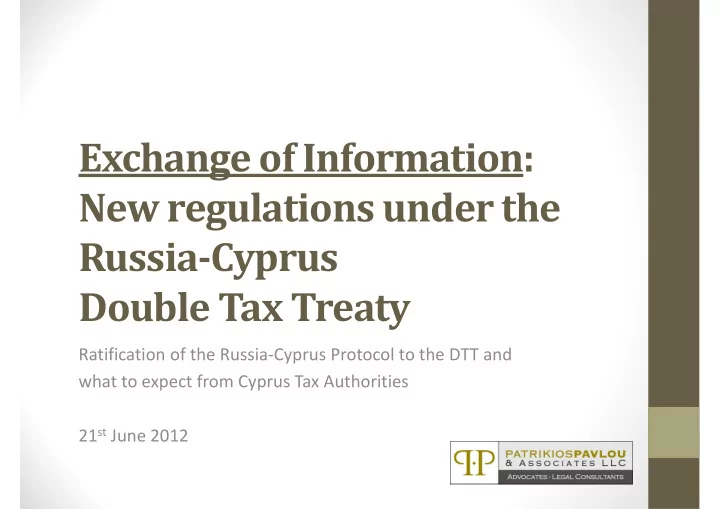

Exchange of Information: New regulations under the Russia ‐ Cyprus Double Tax Treaty Ratification of the Russia ‐ Cyprus Protocol to the DTT and what to expect from Cyprus Tax Authorities 21 st June 2012
Background • Agreement for the avoidance of double taxation between the Republic of Cyprus and the Russian Federation signed on the 5 th of December 1998 and renewed on April 2009. • Protocol to the Cyprus – Russia Double Tax Treaty (DTT) signed on the 7 th of October 2010. • Cyprus ratified the Protocol in September 2011. • Protocol ratified by the Russian Duma on 15 th of February 2012. • The Protocol will come into effect in January 2013, while particular provisions, such as Article 13, will come into force as of 1 st of January 2017. • On the 21 st of May 2012, the Cyprus Inland Revenue Department issued Circular 2012/11 stating that all procedures required by the legislation of each country for the coming into force of the Protocol have been duly completed.
Article 4: Resident • A legal entity is deemed to be a resident of the contracting state if it is liable to taxation in that state based in its place of effective management, place of its registration or any other similar criteria. If an entity is a resident of both contracting states, the place of effective management criterion applies.
Article 26: Exchange of Information • The competent authorities of the Contracting States shall exchange such information as is foreseeably relevant for carrying out the provisions of this Agreement or to the administration or enforcement of the domestic laws concerning taxes of every kind and description imposed on behalf of the Contracting States, or of their political subdivisions or local authorities, insofar as the taxation thereunder is not contrary to the Agreement.
Practical Impact of Article 26 No fishing expeditions • The inquiring jurisdiction may request a confirmation of the identity of a person under investigation as a beneficial owner of a company but may not inquire as to the identity of a beneficial owner of a particular company without having submitted identification.
Practical Impact of Article 26 Cyprus authorities do not automatically collect information • The inquiring country must produce a substantial request that specifies information required by Cyprus law and must prove to the Cyprus tax authorities that it has exhausted all the resources available in its own territory to obtain information, with the exception of those that would cause excessive difficulties.
Article 26.3 • Cyprus is not required to supply information which is not obtainable under its own laws or in the normal course of administration. • The legal professional privilege has not been affected. • Trade, business, industrial, commercial or professional secrets protected. • Disclosure must not be contrary to public policy.
Law 72(1)/2008 • Council Directive 2011/16/EU, 15 th February 2011 on Administrative Cooperation in the field of Taxation (EU Mutual Assistance Directive) coming into force in January 2013. • The inquiring state must provide the Commissioner of the Inland Revenue of Cyprus with the tax reasons and the evidence why the relevant information is required, together with the identification of the individual under investigation and other stipulated matters. • The Commissioner shall not by Law, provide the requested information unless the written consent of the Attorney General of Cyprus has been provided.
Article 27: Assistance in Collection • The obligation of Russia and Cyprus to lend assistance to one another is extended to cover tax of any kind, administrative penalties, interest and relevant costs which have been validly imposed by either of the states. • If a revenue claim is payable in one contracting state, the other shall be obliged to accept the same for collection purposes. • Exceptions: o Public policy o Disproportionate administrative burden o Request not inline with internal practices
Major Practical Consequences of Protocol • Cyprus is expected to be removed from the black list of non ‐ compliant countries issued by the Russian Ministry of Finance. • New minimum EUR 100,000 direct investment. • Companies that invest in immovable property or perform operations with shares and other property rights of companies in the real estate sector should plan their transactions accordingly or consider potential restructuring of their activities. • Assistance in Collection of Information • Assistance in Collection of Taxes
What to expect from Cyprus Tax Authorities • Cyprus tax authorities are not able to comply with the requirements of Article 27 of the DTT since the Republic of Cyprus has not yet introduced changes to its domestic legislation, allowing for the provision of assistance in the collection of taxes. • Council Directive 2011/16/EU of 15 February 2011 on administrative cooperation in the field of taxation (EU Mutual Assistance Directive) which provides for the exchange of information and other forms of administrative cooperation between member states will come into force in January 2013. As a result Russian citizens residing in other EU countries may be caught by the provisions of this Directive and Cypriot authorities will be under an obligation to provide the relevant information.
Recommend
More recommend